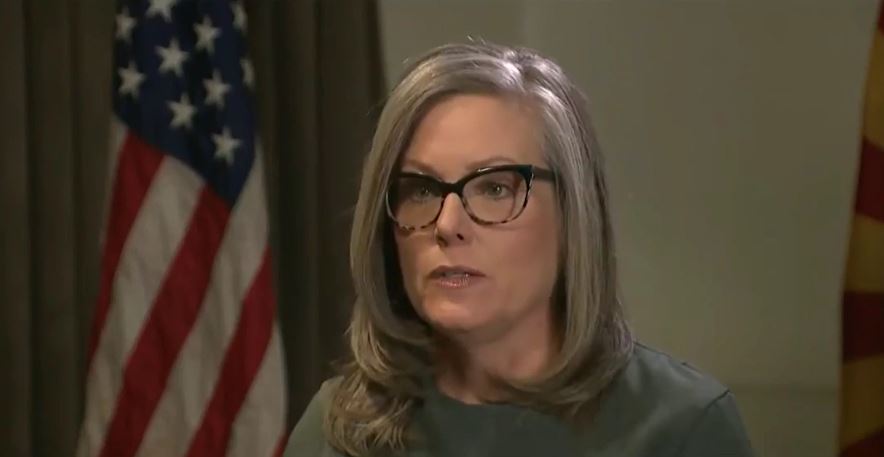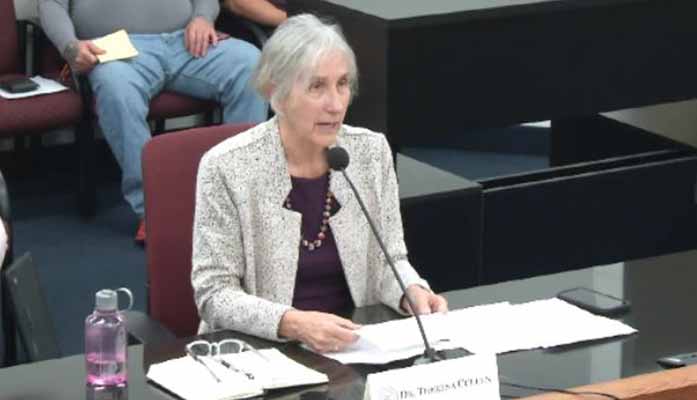
by Daniel Stefanski | Feb 14, 2023 | Education, News
By Daniel Stefanski |
Arizona Governor Katie Hobbs has made no secret of her desire to dismantle the state’s school choice benefits for tens of thousands of children and their families, and this weekend, she was challenged on her desires by Fox News Sunday host, Shannon Bream, during an exclusive interview leading up to the Super Bowl in Glendale.
During the interview, Bream asked the governor why all students shouldn’t have a chance to have the educational opportunities that she had growing up – a reference to Hobbs’ high school graduation from Seton Catholic Preparatory. Governor Hobbs appeared to embrace the rhetoric of school choice proponents as she searched for justification for her positions, responding that her parents “made that choice” and that they “sacrificed a lot” to give her the chance at a private education.
Hobbs went on to say that she wants every student in Arizona to have access to high-quality public education – access that she claimed would not happen under Arizona’s historic Educational Scholarship Account (ESA) program, which was passed last year by the Arizona Legislature. Bream followed up by asking the governor if students should not have a chance to go elsewhere if their school system was failing. Hobbs’ reply was that “the schools are failing because we are failing to invest in them.”
But Governor Hobbs’ rampant claims of the ESA program bankrupting and failing Arizona schools were met with facts from several individuals. Corey DeAngelis, one of the nation’s premier “evangelists” of school choice, tweeted thanks to Shannon Bream for citing his January Wall Street Journal article, showing that Arizona’s ESA program could actually save the state more than $100 million.
And Andrew Clark, Executive Director of Yes. Every Kid. Foundation, tweeted, “The average cost for a family to homeschool is year is about: $2k per kid. Micro-schools and pods are about $5k. Private schools average $10k, charters around $12k. Public schools clock in around $15k. But sure it’s a spending problem for public schools…let’s ignore the facts…”
Governor Hobbs’ answers on school choice quickly went viral after the recorded interview went live Sunday morning, and Arizona Republicans, who are at the front lines of protecting the landmark ESA program, wasted no time in making their thoughts known.
The Arizona Senate Republicans Twitter account posted: “.@GovernorHobbs response makes absolutely zero sense, other than reinforcing why expansion of ESA school choice is so desperately needed.”
Senator Justine Wadsack tweeted, “So #HypocriteHobbs attended PRIVATE school, and her parents made “sacrifices” to put her there. Even found themselves on food stamps! Had #ESA/#SchoolChoice existed back then, her parents would have been given $7,000 to help with the cost of Katie’s education.”
Representative Quang Nguyen stated, “So if your parents afforded you this great opportunity, shouldn’t you make it possible for other parents to give their children the same opportunity you received as a child? Asking for Arizonans.”
Representative Cory McGarr disagreed with Governor Hobbs’ characterizations of district school funding, saying: “Our government schools are failing because we are supposedly starving them of resources?? 73% increase in funding since 2016… Perhaps they are failing because they focus on woke sexualization, feelings and racism and have no accountability because of politicians like this.”
Representative Matt Gress underlined the foundation of the school choice argument, writing: “.@GovernorHobbs’ parents struggled to provide her with an education THEY thought best. It’s unfortunate she wants AZ families to choose between being on food stamps or sending their kids to the school they choose. Let’s help families. Give them a choice, not push them down.”
Representative Austin Smith said, “Booed at the Phoenix Open, health nominee failed in the senate committee and called out for her hypocrisy on school choice on national Sunday show. Bad weekend for Hobbs. Is there anyone who thinks she’s actually an effective leader?”
Representative Justin Heap tweeted: “@katiehobbs is committed to ending Az’s ESA program which allows thousands of Arizona children to receive the same private school education she received. Katie Hobbs definitely believes in pulling the ladder up behind her.”
Daniel Stefanski is a reporter for AZ Free News. You can send him news tips using this link.

by Corinne Murdock | Feb 13, 2023 | News
By Corinne Murdock |
On Thursday, Rep. Debbie Lesko (R-AZ-08) introduced a resolution to protect women by preventing gender ideology from redefining biological sex.
Lesko was joined in the resolution by Sen. Cindy Hyde-Smith (R-MS), titling it the “Women’s Bill of Rights.” In a press release, Lesko declared that the resolution would not only protect but affirm the importance of women.
“Now more than ever, we must protect women’s rights and combat the left’s attempts to erase women,” stated Lesko.
The resolution would define “sex” as a person’s biological sex from birth, “female” as an individual whose biological reproductive system is developed to fertilize their ova, “woman” and “girl” as human females, and “man” and “boy” as human males. The resolution also would declare that “equal” doesn’t mean “same” or “identical,” and that “separate” didn’t indicate inherent inequality.
With these definitions, the resolution would require schools and all levels and divisions of government to identify subjects of data gathering as either male or female at birth, such as for public health, crime, and economic data. It also would make all policies and laws distinguishing sexes subject to intermediate constitutional scrutiny, a test employed by courts to determine the constitutionality of a statute that negatively impacts certain protected classes. Statutes pass scrutiny if they further an important government interest and employ means of accomplishing that interest that are substantially related to that interest.
Further, the resolution would warrant discrimination in certain circumstances.
“There are legitimate reasons to distinguish between the sexes with respect to athletics, prisons or other detention facilities, domestic violence shelters, rape crisis centers, locker rooms, restrooms, and other areas where biology, safety, and/or privacy are implicated,” stated the resolution.
Lesko and Hyde-Smith first introduced the resolution last May, in the 117th Congress. It was referred to the Constitution, Civil Rights, and Civil Liberties Subcommittee last November, but never made it any further. During a press conference last year, Lesko argued that the necessity of her resolution proved that the country has gone “to hell in a handbasket.”
“The world is totally upside down when I have to introduce legislation to define a woman versus a man,” said Lesko. “More and more often our colleagues on the left are trying to erase women.”
That version of the Women’s Bill of Rights was included in the Republican Study Committee (RSC) Family Policy Agenda ahead of the midterm elections. The agenda issued over 80 recommendations to better align the GOP with its goal of advancing families’ interests, focusing on child protections, increased economic power for working families, additional parental rights, increased flexibility to child care, elimination of policies discouraging family formation, incentives to work, school choice, higher education reforms, foster care and adoption reforms, and abortion abolition.
The RSC was established 50 years ago for the purpose of coordinating research efforts by conservative congressmen.
Lesko and Hyde-Smith were assisted in crafting the resolution by the Independent Women’s Law Center and Independent Women’s Voice, two related women’s advocacy organizations.
Independent Women’s Law Center Director Jennifer Braceras said that rooting out sex discrimination won’t be possible without proper definitions of biological sex.
“We can’t fight sex discrimination if we can’t agree on what it means to be a woman. And we can’t collect accurate data regarding public health, medicine, education, crime, and the economic status of women if we redefine sex to mean ‘gender identity,’” said Braceras.
Corinne Murdock is a reporter for AZ Free News. Follow her latest on Twitter, or email tips to corinne@azfreenews.com.

by Corinne Murdock | Feb 13, 2023 | Education, News
By Corinne Murdock |
Northern Arizona University (NAU) will provide free tuition regardless of income to Native Americans from Arizona tribes but requires other races to fall below a certain financial threshold to qualify. NAU President José Luis Cruz Rivera described the arrangement as a cornerstone for the university’s equity work.
“Ensuring access to an affordable, high-quality education is a key part of NAU’s vision to deliver equitable postsecondary value,” stated Cruz Rivera.
This arrangement falls under NAU’s financial aid program “Access2Excellence” (A2E) which launched last April. However, the university didn’t offer this free tuition for Arizona tribal members until last November, after NAU’s Native American Advisory Board pushed for its creation.
Initially, A2E was intended to provide tuition-free college for all students, regardless of race, if their household incomes were at or below $65,000. When A2E launched last spring, approximately 50 percent of Arizona households met that threshold.
NAU stated in a press release that the special free tuition offer for Native American students was part of its “strategic priority” to be the leading university serving Indigenous people nationwide. Ann Marie Chischilly, vice president of the Office for Native American Initiatives, said that this offering represented NAU’s commitment to prioritizing Native Americans.
“We are dedicated to being the nation’s leading institution serving the indigenous peoples and providing a clear and affordable pathway to an exceptional education,” said Chischilly.
Free tuition is one of the latest in NAU’s latest initiatives focused on uplifting Native Americans. In January, NAU pledged $10 million to prioritize Native American and Indigenous people in curriculum and recruitment efforts.
Last March, NAU launched multiple initiatives totaling $1.3 million to increase the number of both Native American and Hispanic science, technology, engineering, and math (STEM) graduates. These initiatives focus on training STEM faculty in anti-racism, revising graduate admissions processes to increase inclusivity and diversity, creating additional supports exclusively for Indigenous and Hispanic students, offering exclusive campus opportunities for Indigenous and Hispanic students’ families.
Department of Biological Sciences professor Catherine Propper predicted that these initiatives would increase anti-racist educational practices in education beyond NAU.
“In this way, we can bring about equity-oriented change in STEM fields by building leadership among faculty to contribute to institutional change, eliminate structural barriers and reduce disproportionality and systemic inequities in STEM fields,” said Propper.
Cruz Rivera asserted that greater funding and research efforts for recruitment, training, and placement on Native American and Hispanic students was an equitable necessity to spur these groups’ economic mobility.
“Together, we can propel more low-income, first-generation students and students of color to the middle-class and beyond,” said Cruz Rivera. “Support for HSIs will pave the way for less inequality, more social mobility and broader economic prosperity in America.”
In June 2021, the Arizona Department of Education (ADE) awarded NAU with $1 million to advance culturally responsive Native American pre-K-12 educators.
The A2E program goes into effect this fall. Those admitted to NAU for fall 2023 or spring 2024 semesters qualify.
Corinne Murdock is a reporter for AZ Free News. Follow her latest on Twitter, or email tips to corinne@azfreenews.com.

by Corinne Murdock | Feb 12, 2023 | News
By Corinne Murdock |
The Phoenix Open crowd reportedly booed Gov. Katie Hobbs after her attendance was announced at the tournament on Wednesday.
Eyewitness accounts say the incident occurred at the Skybox stadium located on Hole 16 on Wednesday, a day before the opening day of the Waste Management Phoenix Open. Hobbs was brought onto the green to greet the crowds in the stadium. A video posted later that day allegedly captured the incident.
Twitter users who claimed they were at the open claimed that Hobbs looked “dejected” after walking off the course.
Another user said that Hobbs attempted to wave at the crowd, but received boos instead.
The campaign team for Hobbs’ GOP opponent, Kari Lake, claimed that Hobbs was also booed at a recent Phoenix Suns game.
Lake asked social media users to send in their videos of the booing, with promises that they would give them credit and “help them go viral.”
Apparent dissatisfaction with Hobbs’ first days in office may be considered bipartisan.
The governor stood opposed to the favored pick to take over the Arizona Democratic Party (ADP) chairmanship. Hobbs endorsed Maricopa County Supervisor Steve Gallardo; he also served on her transition team. However, top Democratic leaders and officials sponsored Yolanda Bejarano, ADP’s former vice chair. Bejarano won the election last month.
Hobbs didn’t congratulate Bejarano individually following the election; rather, the governor opted to congratulate the entirety of the new ADP board.
Prior to her swearing in, Hobbs stirred up controversy when she neglected to disclose the cost and funders behind her inauguration ceremony. It wasn’t until several days after her inauguration that the nonprofit accepting donations on her behalf for the event released the names of the donors and their amounts donated.
According to Hobbs, her “Katie Hobbs Inaugural Fund” accepted $1.9 million from about 235 donors. Arizona Corporation Commission (ACC) records disputed Hobbs’ initial claim that she raised about $1.5 million from 120 donors.
The inauguration costed $207,000 — about 11 percent of total donations. This inspired questions of the purpose for the remainder of the funds as government transparency watchdogs called for investigation of whether Hobbs’ inauguration team purposefully accepted more donations than they knew were necessary.
Attorney Tim La Sota told “The Conservative Circus” that Hobbs’ use of a state website to solicit inaugural funds presented a potential legal issue.
“That’s definitely a no-no,” said La Sota. “That’s no different, hardly, than just putting a link on the governor’s official state website to her campaign account and saying, ‘Hey, you know, do you want to support me politically? Go to my campaign.’”
The inaugural fund was established as a 501(c)(4) nonprofit by Hobbs’ campaign manager, Nicole DeMont. That classification enables the funds to be used for any promotion of “social welfare,” per IRS rules. Under this classification, the remaining $1.7 million could potentially be applied to certain political efforts that advance “social welfare,” like lobbying.
Corinne Murdock is a reporter for AZ Free News. Follow her latest on Twitter, or email tips to corinne@azfreenews.com.

by Daniel Stefanski | Feb 12, 2023 | News
By Daniel Stefanski |
Governor Katie Hobbs has been reticent to transmit her nominations for state agency heads to the state legislature, and the effort by the Arizona Senate to bring transparency to the process may not lend itself to greater cooperation by the Ninth Floor going forward.
On Thursday, the Arizona Senate Committee on Director Nominations met for its first meeting to consider two of the nominees that Governor Hobbs sent to the legislature. A.R.S. 38-211 prescribes that “the governor shall nominate and with the consent of the senate appoint such officer,” and that “the governor shall during each (legislative) session nominate a person who meets the requirements of law for such office and promptly transmit the nomination to the president of the senate.” The Senate’s constitutional responsibility to provide “consent” for Governor Hobbs’ nominees led to President Warren Petersen forming this committee to “recommend a course of action for the Senate to take on each individual.”
But Governor Hobbs has only fulfilled her constitutional responsibility to “promptly transmit” a select number of nominees – and two of them were before the Senate Committee Thursday. The first individual up for consideration was Angie Rodgers, the nominee to lead the Department of Economic Security. Rodgers has been the President and CEO for the Arizona Food Bank Network and previously served in the Napolitano administration as the governor’s Human Services Policy Advisor. Though Republicans on the committee did have concerns about how she would lead this agency, the vote to favorably recommend her to the full Senate was unanimous.
It was the second nominee considered by the committee who brought the most contention, however. Dr. Theresa Cullen, who Hobbs nominated to run the Department of Health Services, is currently the Director of the Pima County Public Health Department – a position she has held since June 1, 2020. Both Dr. Cullen and Rodgers were announced in the first round of future nominees on December 27, 2022, by then-Governor-elect Hobbs.
Arizona Republicans pointed out multiple inconsistencies in her answers throughout the afternoon. On two occasions, Senate President Petersen sharply chided her responses and served a warning about her future as a public servant, writing, “Any nominee who gets caught lying at a confirmation hearing is not fit to serve the state of Arizona. The 9th floor could learn from Napolitano. Napolitano did not appoint radical lefties as directors.”
After enough time was spent on vetting Dr. Cullen’s past (especially her leadership over the Pima County health response to the COVID-19 pandemic) and her ability to lead this Department in the future, members of the committee voted against recommending her nomination to the full Senate with a party line 3-2 vote.
Senate Republicans, who now have a decision to make about Dr. Cullen’s future employment at the Department of Health Services, had plenty to say after the hearing was complete. Senator John Kavanagh tweeted, “Her repressive covid policies when she led Pima County Health included an illegal 10pm-5am curfew.” Senator Sonny Borrelli wrote, “Why would @GovernorHobbs appoint Dr. Cullen to a critical position, such as state health director, when her testimony in committee clearly showed she makes decisions based on politics and not commonsense or data?” Senator Anthony Kern stated, “Dr. Cullen prided herself on locking down Pima County, ruining the livelihoods of her constituents while she raked in a comfortable $200,000/yr. salary.” Committee Member Janae Shamp said, “Dr. Cullen provided misleading responses and failed to accept responsibility for her record.” Senate President Pro Tempore T.J. Shope tweeted, “I respect Dr. Cullen’s experience, but her poor judgement in Pima County reflects poorly on her – and even more poorly on Hobbs.” And Senator Wendy Rogers left no doubt with her thoughts from the hearing: “True leaders never reply, ‘I don’t know’ to tough questions. Shame on @GovernorHobbs for nominating Pima county’s MEDICAL TYRANT Dr. Theresa Cullen for State Health Director.”
Governor Katie Hobbs was also not happy after the hearing – but for different reasons than legislative Republicans. She released a statement, saying, “What we witnessed today was an exercise in political theater, and it is a shame that Arizonans have to suffer for it. Dr. Admiral Cullen has a distinguished career in medicine and public health that spans decades, and I stand by her nomination. Her dedication and vision in making our state the healthiest it can be is exactly what Arizona needs right now.”
Daniel Scarpinato, a Chief of Staff to former Governor Doug Ducey, had some valuable insight about the committee process and genesis, tweeting, “All Governors must work with the Legislature. It’s part of our process and a system taught in basic civics. The Arizona Senate gets to determine how they want to conduct the process, and I think the one they have developed is a very good one.” He went on to say that “No one can accuse this AZ Senate Committee of being a partisan exercise. Their questions are fair and appropriate. Sen. Hoffman is doing an excellent job as Chairman.”
Both Dr. Cullen’s and Rodgers’ nominations now head to the full Senate chamber for a vote on their future in the Hobbs’ administration.
Daniel Stefanski is a reporter for AZ Free News. You can send him news tips using this link.

by Corinne Murdock | Feb 12, 2023 | News
By Corinne Murdock |
Out of the nearly 14,000 abortions performed in 2021, at least nine babies were born alive following a botched procedure.
The data comes from the Arizona Department of Health’s (AZDHS) latest report on abortions in the state for 2021. 2020 had the exact same number of babies born alive following a botched abortion.
AZDHS issued its latest report the day after the Arizona Appeals Court ruled that the state’s near-total, pre-statehood abortion ban couldn’t be used to prosecute abortionists. The court upheld the law codified last March, which allows abortions up to 15 weeks.
State reporting on botched abortions resulting in live deliveries went into effect in August 2017. That year, the state reported at least 10 abortions that resulted in the baby delivered alive between August and December 2017. In 2018, there were 12. Then in 2019, there were 15.
The number of abortions have fluctuated slightly over the years, marking a general upward trend since 2010, when there were more abortions performed that year than in any other year since 2004: over 11,400 abortions.
2010 was the year the state began tracking abortions, due to a newly passed law at the time. The all-time high for abortions on record in one year occurred in 2011, though this year came closer to meeting that record.
In 2011, there were over 14,400 abortions; 2012, over 13,300; 2013, over 13,400; 2014, about 12,900; 2015, over 12,600; 2016, 13,300; 2017, over 12,500; 2018, over 12,400; 2019, over 13,000; and in 2020, over 13,200.
99 percent of the 2021 abortions were administered to Arizonans.
The greatest demographic of women receiving abortions were aged 20 to 24 years old (nearly 31 percent), followed by 25 to 29 years old (27 percent), 30 to 34 years old (18.6 percent), 35 to 39 years old (10 percent), 18 to 19 years old (seven percent), 40 to 44 years old (three percent), and 15 to 17 years old (nearly two percent).
READ THE REPORT: 2021 ABORTIONS IN AZ
There were 19 total abortions administered to girls under the age of 15. According to AZDHS data, that rate declined by over 63 percent since 2012, and by over 11 percent since 2020. Likewise, teen girls aged 15 to 19 declined in abortion rates by nearly 16 percent since 2012, but did increase by six percent since 2020.
There were 31 abortions administered to women at or over the age of 45.
In 2021, about 15 percent of those who obtained abortions were married. That percentage has remained stagnant over the years, reaching a brief high of 17 percent in 2012 but ultimately averaging at about 14 percent. Unmarried women have generally made up 79 to 87 percent of abortion patients.
The largest portion of missing data concerned the educational status of the women receiving abortions. About 38 percent of that data was missing.
The following were the top-five clinics that performed the most abortions in 2021, in order: Camelback Family Planning, nearly 4,000; Family Planning Associates Medical Group, over 3,500; Planned Parenthood Tempe Health Center, nearly 1,600; Planned Parenthood Glendale Health Center, nearly 1,200; and Desert Star Family Planning, over 870. The state listed 17 facilities that performed abortions.
In addition to requiring abortion providers to report on botched abortions that result in a live birth, the state requires abortionists to use “all available means and medical skills [to] promote, preserve, and maintain the life” of the baby.
Only three abortions were partially or fully paid for using state monies through the Arizona Health Care Cost Containment System (AHCCCS). There weren’t any abortions paid for using state monies in 2020.
Corinne Murdock is a reporter for AZ Free News. Follow her latest on Twitter, or email tips to corinne@azfreenews.com.






